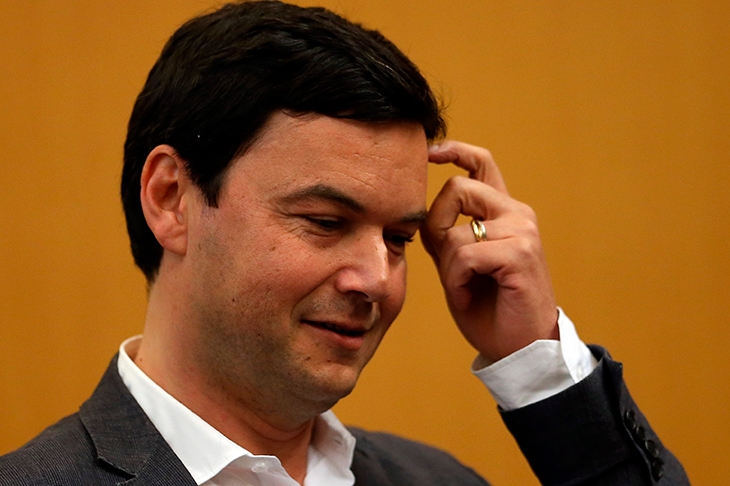The French economist, statistician and polymath Thomas Piketty sprang to fame in 2013 with a daunting tome, Capital in the Twenty- First Century. In it he documented a ‘fundamental force of divergence’ in the capitalist system, which he represented by the equation r>g — the tendency for returns to capital to grow faster than national income, and therefore for wealth to concentrate in fewer and fewer hands. This tendency was reversed between 1914 and 1980 by the impact of two world wars, the Great Depression, social democracy and the trade unions, but it has since reasserted itself, restoring levels of inequality last seen 100 years ago.
In his new blockbuster, Capital and Ideology, Piketty studies the transformation of ‘inequality regimes’ from premodern ‘trifunctional’ and slave societies to today’s hyperglobalization, concentrating on the ‘capitalist’ or ‘proprietarian’ period from 1800. The book culminates in a program for social democratic renewal to overcome the distempers of hyperglobalization. The whole trajectory of human history is compressed into this framework — if compression is the right word to describe this sprawling production of more than 1,000 pages Piketty has amassed a huge amount of learning in support of a single thesis: that ‘inequality societies’ have been the historical norm but they are not inevitable. Rather, they depend on ideologies of justification, and much of the book is devoted to examining these ideologies, showing how they have always been contested and how they might be transcended, It is impossible not to admire the skill and perseverance with which he deploys his massive arsenal of data and arguments. Still, what caused this reviewer to rub his eyes was Piketty’s audacious self-assurance. Despite much cosmetic homage to the daunting complexity of his subject matter, he really does believe that he has solved the riddle of history. The magic key is not Marx’s class struggle but ideological conflict over property systems. Property ownership, Piketty writes, always involves workers sacrificing ‘a substantial proportion of her [sic] wage to an owner’s profit or landlord’s rent …That is why property relations are always conflictual.’ Each new property-ownership system creates contradictions which lead to its demise. Conflict ceases when private property ceases to be important. Thus Piketty’s history too leads to the ‘end of history’.
In the light of this reading, his reform agenda seeks, logically enough, to rob property of its sting. He rejects public ownership of the means of production — the communist fallacy. Rather, he seeks to modify the property system by supplanting ‘sacralized’ private ownership with ‘public, social and temporary ownership’, realized by co-partnership and steeply progressive taxes on wealth and income. Political control over international capital would be secured by regional, and eventually global, federalist structures:
‘What I have just described is a cooperative and ideal (not to say idyllic) scenario that would lead, via concentric circles, to a vast transnational democracy, ultimately resulting in just common taxes, a universal right to education and a capital endowment, free circulation of people, and de facto abolition of borders.’
Piketty repeatedly insists that his is the only progressive way of overcoming the social anger of our own times. Nineteenth-century European ‘ownership’ societies conquered the world but failed to establish fully legitimate governments because the extreme concentration of wealth they produced generated social tensions which ultimately led European nations to self-destruct. The ‘compression’ of inequality in the mid-20th century, made possible by social democratic ideas and labour and democratic mobilization, eased social conflict, but didn’t go far enough, allowing ‘neo-proprietarianism’ to creep back. Today we again face a choice between progress and self-destruction.
Whatever we think of Piketty’s remedies, we should not ignore his warning. Since the crash of 2008 there has been growing discontent with the hyper-globalist model of progress, in which financial capital is set free from national control, allowing it to accumulate without limit. Piketty argues that the justified anger of the ‘least advantaged’, now being mobilized by ‘nativist’ and ‘identitarian’ political movements (Piketty rightly rejects calling them ‘populist’), may well develop a destructive momentum unless it is harnessed to a renewed model of social progress. His giant historical tome is thus conceived as an antidote to both ‘hyper-capitalism’ and the ‘post-colonial identitarian trap’. Social democracy is the only way to save the planet from disaster.
The obvious question is: has Piketty read the plot of history right? There are at least five reasons to doubt it.
First, Piketty is unable to explain the historic persistence of inequality of wealth and power. The so-called ‘trifunctional’ systems of pre-modern times, in which society was divided into priests, warriors and cultivators, did not need to be justified ideologically: it was seen as part of the natural order of things. It was only when property lost its ‘regalian’ (governing) functions to the centralized state in the 19th century that the legitimacy of unequal property holdings started to be politically questioned. This happened with capitalism. Capitalism, which emancipated property from social duties, was not natural, so a function had to be invented for it, which was to lift humanity out of poverty. Setting capital and labour free to be bought and sold in global markets would benefit all. Piketty is particularly good on the role of neoclassical economics in robbing capitalism of its taint of illegitimacy.
But what his account ignores is that conflict has always been as much about identity as about equality, and the first cannot be reduced to the second, as Piketty wants to do. The idea that property relations are ‘real’ and national borders are artificial smacks of the old Marxist fallacy. It led Marxist parties to believe that workers had no country and would not rally to the national cause in 1914. The same blindspot leads Piketty to a partly wrong diagnosis of our present discontents. What he attributes to anger at rising inequality is just as importantly fear of loss of national identity. Borders define communities, as the Brexit vote showed. Identity, like nature, has a habit of turning on those who ignore it.
A second quibble is Piketty’s overuse of counter-factual history. The transparent object of this strategy is to show that at no ‘switch point’ in the past has an inequalitarian outcome been inevitable. The history of what might have been protects us from the error of determinism — the belief that whatever is had to happen. The trap, though, into which Piketty often falls, is a failure to distinguish feasible alternative futures from fanciful ones.
The first world war might have been avoided had the balance of forces been modestly different, but Piketty’s belief that the French Revolution represented a missed opportunity to establish a system of progressive taxation is fanciful: as he himself admits, it would have required a ‘change of mentalities’, which came only 100 years later. Piketty might have heeded Marx on this: ‘Men make their own history, but they do not make it as they please, but under circumstances given and transmitted from the past.’
Third, Piketty fails, it seems to me, in his heroic attempt to generalize his theme by including the property ‘trajectories’ of non-European societies. His basic idea is that the forced incorporation of overseas colonies into the European property system had the double effect of increasing the concentration of wealth in the metropoles and foisting highly unequal property regimes on the conquered countries, which stifled ‘social transformation’. Much of this is quite plausible. But on the way, Piketty uncritically embraces two highly disputable tenets of post-colonial history: that Europe’s industrial revolution was financed by the profits of slavery, and that Europe’s intrusion into the affairs of the great civilizations of India and China was an important cause of their economic ‘retardation’. A bit of counter-factual history would have been a useful counter to these arguments.
Fourth, Piketty fails to provide a convincing explanation for the collapse of the social democratic regime in the 1970s. The accepted view, that it ran into an inflationary crisis, seems to me to be broadly right. He gives much more weight to its failure to deliver on its promise of equal educational opportunities. The parties of the left increasingly attracted the support of university educated professionals, who were more concerned to maintain their improved position on the property ladder than to widen educational opportunities for the bottom 50 per cent. Thus the meritocratic promise was dimmed, weakening the appeal of the left to the left-behinds. There is again something in this. But the dates don’t work out, and one is aware of Piketty laundering the facts to fit his theory.
My final quibble is that Piketty completely ignores the role of John Maynard Keynes in developing the social democratic alternative to both communism and fascism in the interwar years. Perhaps this is due to the French perception of Keynes as anti-French, dating back to his attack on the Treaty of Versailles. More charitably, Keynes cannot be slotted easily into Piketty’s historical plot. Keynes wrote in 1936: ‘The outstanding faults of the economic society in which we live are its failure to provide for full employment and its arbitrary and inequitable distribution of wealth and incomes.’
Piketty’s story of social democracy is told entirely in terms of its impact on inequality. He fails to mention its impact on employment. In general, he underplays the role of the Great Depression and indeed the historic specificity of the social democratic epoch, in which the problem of unemployment and social security was much more important than the question of equality. Since he fails to understand that full employment and progressive taxation formed a single social democratic package, it is not surprising that he ignores the employment consequences of the great financial collapse of 2008 in stirring present discontent, and has nothing to say about job security in his idyllic vision of the future.
In this flawed masterpiece there are, nevertheless, many thoughts and phrases which stay in the mind and can help organize thought about the past and future. I particularly appreciated Piketty’s conceit that western politics is now split between a ‘Brahmin Left’ and a ‘Merchant Right’, leaving the least advantaged out in the cold. Decent politics must find a way of re-engaging with them.
This article was originally published in The Spectator’s UK magazine. Subscribe to the US edition here.

























